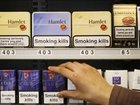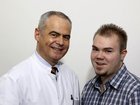South Africa's AIDS deaths have fallen by nearly 25 percent due to scaled up access to life-saving drugs, which the government for years had refused to provide, new research has shown.
"The rapid expansion of South Africa’s anti-retroviral program appears to have slowed down the AIDS mortality rate in recent years," said the Actuarial Society of South Africa (ASSA) in a statement.
 Full Story
Full Story
Women who enjoy a daily dose of coffee may like this perk: It might lower their risk of stroke.
Women in a Swedish study who drank at least a cup of coffee every day had a 22 to 25 percent lower risk of stroke, compared to those who drank less coffee or none at all.
 Full Story
Full Story
The Food and Drug Administration approved Wednesday the first new drug to treat lupus in over 50 years, a milestone that medical experts say could prompt development of other drugs that are even more effective in treating the debilitating immune system disorder.
Known as Benlysta, the injectable drug is designed to relieve flare-ups and pain caused by lupus, a little-understood and potentially fatal ailment in which the body attacks its own tissue and organs.
 Full Story
Full Story
The cigarette packs piled into prominent displays behind store counters and supermarket checkouts in England can't be missed. They occupy prime retail real estate, helping to keep addicts hooked and quitters tempted.
But the government announced a ban on them Wednesday, a move that will keep cigarettes hidden away and make it just a tad more difficult for smokers to find their fix.
 Full Story
Full Story
When people do not get enough sleep, they tend to make overly optimistic decisions and may be more prone to risky gambling, U.S. researchers said.
The study published in the journal Neuroscience provides scientific evidence for what casino managers have long known -- that flashing lights and ringing slot machines encourage gamblers to keep going until their money is gone.
 Full Story
Full Story
The treatment beating back 9-year-old Dylan Hanlon's cancer may also be destroying his chances of fathering his own children when he grows up.
Upset that doctors didn't make that risk clear, his mother, Christine, tracked down an experiment that just might salvage Dylan's future fertility. Between chemo sessions, the pair flew hundreds of miles from their Florida home to try it.
 Full Story
Full Story
Scientists in Europe report they were able to diagnose Down syndrome prenatally by giving a simple blood test to pregnant women, an approach that might one day help them avoid the more extensive procedure used now to detect the condition.
The preliminary report published online Sunday in the journal Nature Medicine is the latest of several recent studies that suggest scientists can spot Down syndrome through fetal DNA that has been shed into the mother's bloodstream.
 Full Story
Full Story
Patrick Hetzner tried diets and exercise, just about everything short of stomach stapling to lose weight. Nothing worked. Five months ago he tried something new: a stomach pacemaker that curbed his appetite.
Since having it implanted, Hetzner, a 20-year-old Munich mailman, has knocked off more than 10 kilos (22 pounds) from his earlier weight of 104 kilos (229 pounds).
 Full Story
Full Story
Adults who take the anti-inflammatory drug ibuprofen may reduce their risk of getting Parkinson's disease by about 27 percent compared to those who do not, said a study published Wednesday.
"There is no cure for Parkinson's disease, so the possibility that ibuprofen, an existing and relatively non-toxic drug, could help protect against the disease is captivating," said senior author Alberto Ascherio of the Harvard School of Public Health.
 Full Story
Full Story
Teenagers and young adults who use cannabis face increased risk of psychosis, research published in the British Medical Journal showed Wednesday.
Experts from Germany, the Netherlands and London's Institute of Psychiatry studied 1,900 people aged between 14 and 24 over a period of eight years.
 Full Story
Full Story



